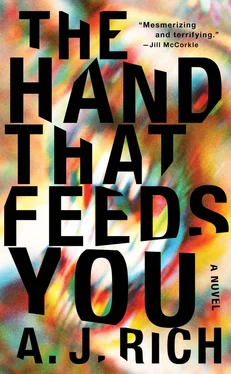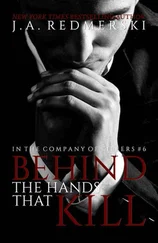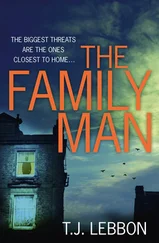In the dark yard, cluttered with balls and a coiled hose that tripped me, I held up the phone, waving it to try to catch a signal. But what I heard first was a gunshot from inside the shelter. One shot. Whom had the second cop fired on? One dog? That wouldn’t stop the other. I waited for a second shot.
Instead I got a signal.
“What is your emergency?”
“A cop is being killed. We’re on East 119th Street, the animal shelter. Please hurry.”
The door into the backyard pushed open. Billie. And one of the Dogos at her side.
Billie made a show of looking around. “Can you imagine this is the only exercise yard they have?”
“Your dogs killed that cop.”
“That cop killed one of my dogs.”
I saw movement behind Billie. And so did the dog. The door opened, and I saw the second cop with his gun drawn. Before the cop was all the way through, the Dogo lunged. The cop got off a shot, but the dog’s attack on his firing arm caused the bullet to hit Billie. She went down, but was not unconscious. She swore and clutched her leg. The Dogo had knocked the cop’s gun out of his hand with such force that it had skittered across the pavement, stopping closer to Billie than to me.
I kicked it past Billie’s reach and turned my attention to the Dogo and the cop. The cop was on his back, twisting and fending off the dog with his arms. I took aim but didn’t trust myself to hit the dog and not the cop.
“Make him stop!” I yelled at Billie.
“It’s the female. That’s Heidi.”
I turned the gun on Billie. “Make her stop,” I said evenly.
“Like you’re going to shoot me.”
As much as I wanted to, she was right.
I shot at the dog and dropped her.
I heard sirens over the chaotic barking, meaning a full-on response — a cop was down. I turned the gun on Billie and waited for the police to find us.
“You can’t say it hasn’t been an education,” Billie said.
“Out here,” I yelled, not knowing if the cops could hear me yet.
“Always looking to a man to save you.”
Then the door to the exercise yard opened. A stream of cops, guns drawn, pushed through.
“Drop your weapon,” one of them yelled. For an odd moment I didn’t realize he was addressing me. “Put down the gun.”
I set the gun down.
One of the cops kicked it away from me and said, “Down on the ground.” He kicked my legs apart, frisked me, grabbed my arms, and twisted them behind my back to handcuff me.
“She shot me,” Billie called out. “My leg. I can’t walk.”
“Get the EMTs out here,” one of the cops yelled to another.
“Is the other officer okay?” Billie asked.
“I’m not the one you should be worried about,” I said to the cop holding me down. He said nothing, just yanked me to my feet.
“You hurt anywhere else?” one of the cops asked Billie.
“She came out of nowhere. I’m just a volunteer.”
The EMTs arrived and began working on the mauled cop. Seconds later, another pair moved quickly into the yard and knelt beside Billie.
“Were you shot anywhere besides your leg?” an EMT asked.
“I can’t feel my leg.”
I finally found my voice. “Those white dogs are hers. They’re attack dogs. She commanded them to attack the officers.”
“I don’t think I’m hit anywhere else,” Billie said.
A cop came into the yard and said to his partner, the one who was holding me, “We lost Scott. Fucking dogs ripped his throat open.” The cop grabbed me by the throat. “I should rip your fucking throat out.”
“Not here,” said the cop holding me.
After the EMTs got an IV going for Billie, they lifted her onto a stretcher, but waited for the unconscious cop to be evacuated first.
Despite the activity all around me, I sensed things as being done in slow motion. I looked up at the run-down apartment buildings that flanked the open backyard. Lights were on, windows were open, and people on every floor were watching and taking pictures with their phones.
A dozen or so cops moved to surround me — the guilty one — and pushed me back inside. When they marched me past the body of the dead cop, they stopped and forced me to look. I threw up. Billie was right — this one was on me.
Out front, the scene was militaristic; helicopters shone searchlights on the shelter. As I was being shoved into a squad car, one of the cops Mirandized me.
A convoy of squad cars escorted me to a precinct, the 25th. I was taken straight to an interrogation room and handcuffed to the table.
I had the good citizen’s certainty that I would be cleared. But I felt the soul-honing fear that I would not.
There would be no witness if the second cop died. Even if he lived, he didn’t know who was responsible. It would be Billie’s word against mine, and she had the bullet in her body.
They thought I was a cop killer. Maybe, by default, I was. I’d had a chance to kill Billie and her dogs and I hadn’t taken it. I started itching all over. I felt welts rising on my back, on my chest. It made me short of breath. Anxiety could produce any number of somatic symptoms, I knew. I both wanted someone to come into the room and feared it. I was twisting in the chair, trying to scratch my back. And I had to urinate.
I gave up looking at my watch after the first hour. With no idea who might be watching me through the one-sided glass, I struggled with my free hand to pull down my jeans enough to go right there on the floor of the interrogation room. Give them a show, if that’s what they were determined to wait for.
I angled my body as much as I could away from the glass and squatted. But after waiting so long, I wasn’t able to release my bladder right away. I prayed that no one would enter the room now. Though maybe some of the officers were having a good laugh just outside.
The puddle covered a large area under the table I was handcuffed to and leaked out beyond the chair I had occupied. Easier to pull pants down with one hand, I discovered, than to get them back up. There was no getting the zipper up. It did not escape me that soiling their own space was what caged dogs were left to do.
Two plainclothes detectives came in, one holding a folder, the other holding his nose. “The fuck did you do in here?”
“When do I get my call?”
The disgusted one banged on the door. “Get us some paper towels.” When a roll of paper towels was delivered, he tossed it to me and told me to clean up the floor.
“I’m handcuffed.”
“You managed to pull down your pants.”
I made no motion toward doing what he said. “I want my phone call.”
The one with the folder said, “Do you know a Jimmy Gordon?”
I repeated what I wanted.
He tried again, this time showing me a photograph of the crime scene — my bedroom.
“Phone call.”
“You just got a cop killed. If I were you, I’d start cooperating,” said the detective who’d called for paper towels.
“I want my lawyer.” I sensed the detectives were trying to employ the outdated Reid technique of interrogation — I’d learned about it in first-year psychology. A cop looks for signs of anxiety during questioning: folded arms, shifty gaze, jiggling leg, touching one’s hair. They try to play down moral consequences—“Hey, everybody fights with her boyfriend.” The irony is that the case policeman John Reid made his name on turned out to be a false confession.
One of the detectives signaled at the window for a phone, and in a moment he opened the door and was handed a desk phone. He plugged the line into a jack in the wall and set it down in front of me. “Local only.”
I phoned Steven.
“I’ve been waiting up for you.” His relief was palpable.
Читать дальше

![Корнелл Вулрич - Eyes That Watch You [= The Case of the Talking Eyes]](/books/32103/kornell-vulrich-eyes-that-watch-you-the-case-of-thumb.webp)









